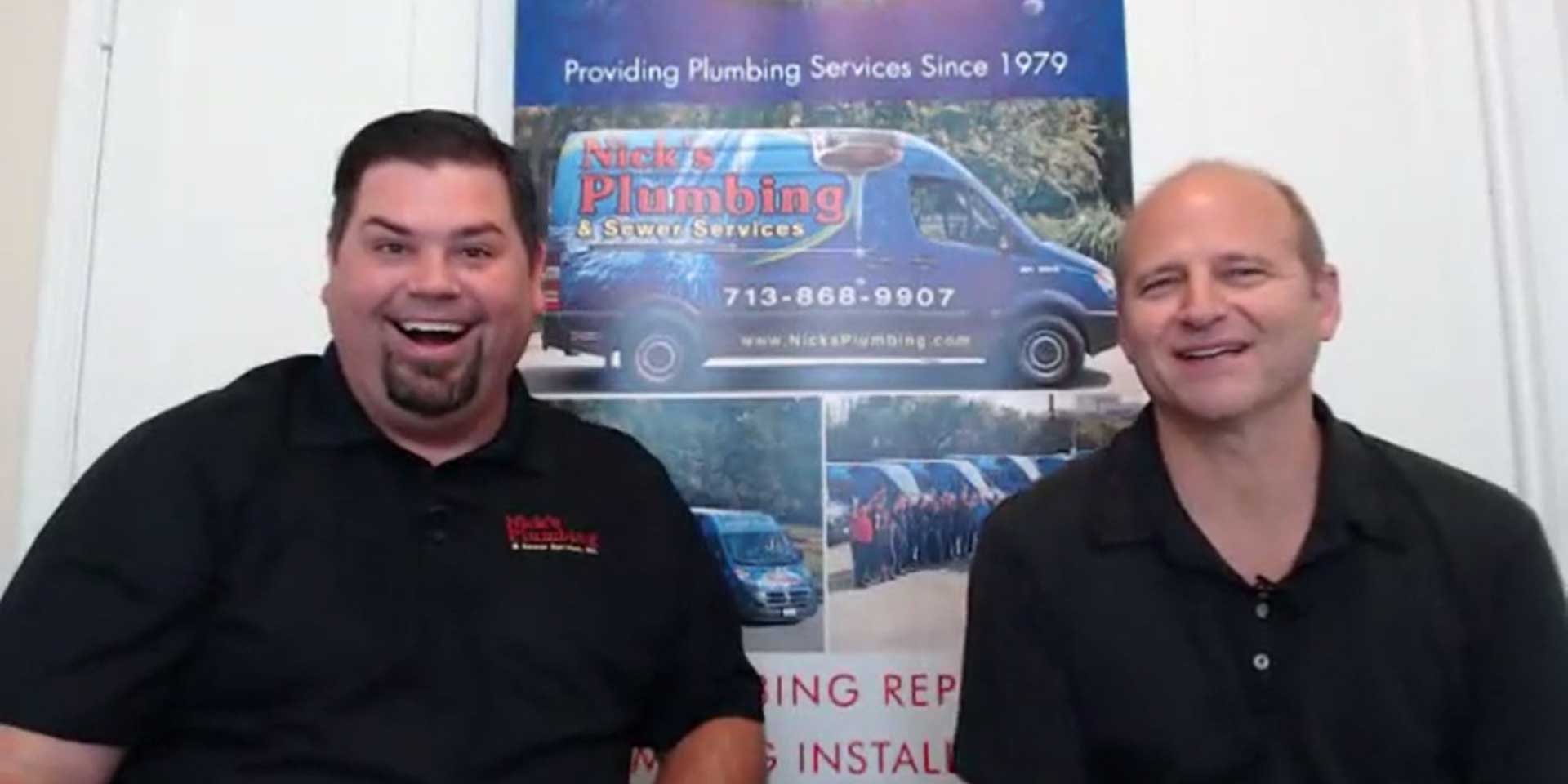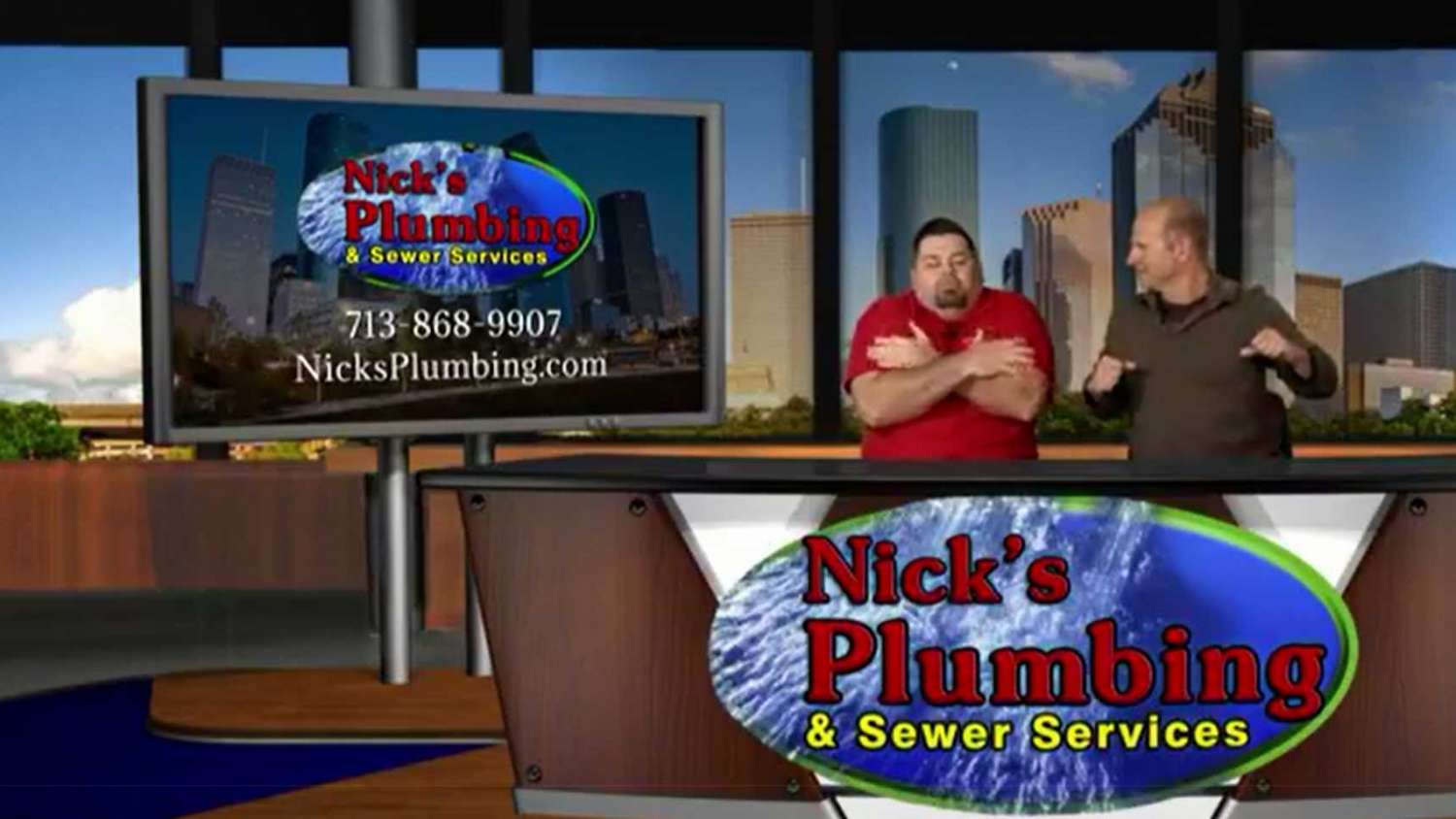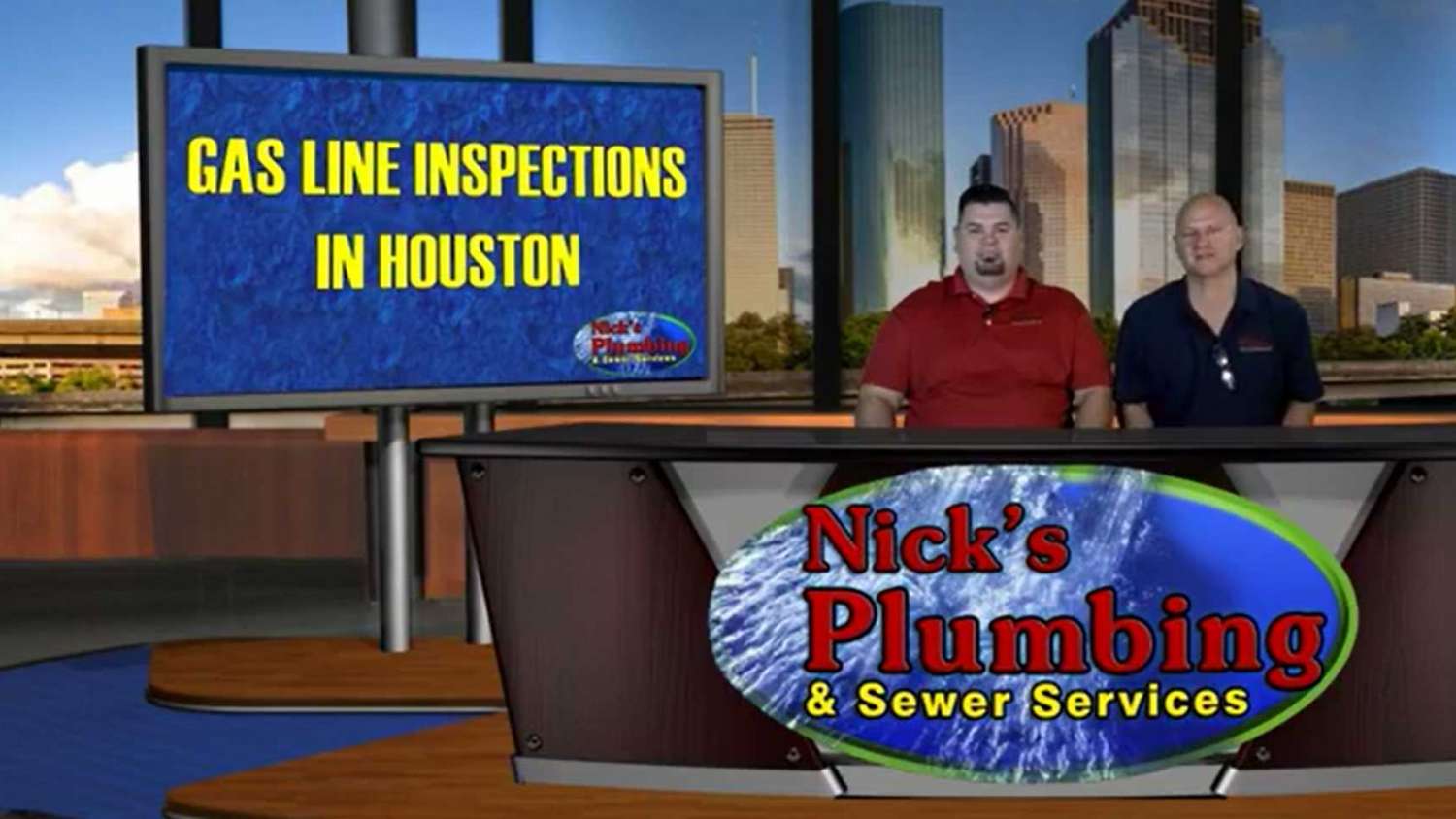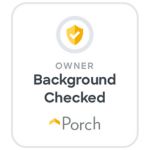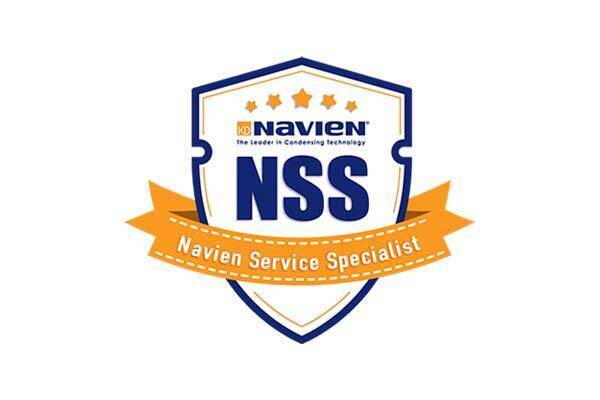Nick's Plumbing & Air Conditioning Live Video Transcription:
Hey guys, we’re back for another edition. Potty mouth guys. How’s it going? This is Mr. Potty, right Mr. potty mouth, John Eccles, Richard Saad coming live to you from the Houston Heights world headquarters. Nick’s Plumbing & Air Conditioning. Our topic today, leak detection specifically for gas. What to do, what not to do. Um, we’re dealing with the oldest parts of Houston, Heights, Montrose, River Oaks, West U, Bellaire and the gas piping is original in most of these homes and all the way through Memorial. Uh, if you smell gas, we’re going to talk today about what should you do, what’s the process and how to think around it. It’s pretty simple.
So let’s lead off, um, as a customer, you smell gas in your home. What’s the first thing you do? Right? You’re going to do one or two things. Most people have to call a plumber or they call Center Point, right? I think most people, their first thought around gas is, we don’t own the gas. Correct. They think that Center Point owns the gas, which is true. But here’s the way to think about that. Center Point owns the product, not the service. Correct. We own the service, which means anything that goes wrong in your home, uh, having to do with gas is us a plumbing company. Let’s try normally thing called center point. If they smell gas or did it take gas and they’re, all they’re gonna do is shut your meter off, lock it out a to get it fixed by a plumber and then call them back, right?
Yeah. And when you make that phone call with center point, you can pretty much bet that if you did smell gas, of course you’re calling them for that reason, they’re going to show up. They don’t care if it’s zero degrees outside, they’re going to shut your meter off, lock it, and either take the meter or they don’t take the meter, but they have a lock on it so you cannot turn it back on, which could present a big problem. You have no hot water for showers and no heat in the house if it’s cold. But on that, on that side of caution, I think that’s, um, that’s the right thing to do with gas. I don’t know if anybody was watching the news and I didn’t get the whole story, but I believe that it was a gas leak that caused the explosion of the home over in the second ward.
If I’m not mistake, it happens all the time. I mean, it almost leveled that house happens all the time, but they don’t ever discuss it. And it’s never on TV. I mean, it’s happens a lot more than what you think, but in saying that, a lot of that’s gonna have to do with propane. Natural gas typically won’t have that explosiveness that propane does and a lot of those homes that are being leveled or propane, propane during explosive. Yeah. You know, um, you know, the other, the other, uh, danger of natural gas is, is if you have a gas leak in a room in the middle of the night and you don’t know, and you’re inhaling it, that’s, that’s not good. You know. So I mean, there’s some very big dangerous. That’s what centrepoint taste so seriously, they’ll lock it out very quickly. They, they’re more concerned about the safety aspect rather than your comfort.
Right. Which, you know, um, there is a business to sell a product. Absolutely. That’s the bottom line. Absolutely. And it’s a hazardous product. Absolutely. So they do have to do protection, do they are required. Basically when you call them, they’ll see if it is leaking. If they have a leak, then boom, you’re locked, right? They’re not going to give you a product if it’s leaking out. So in saying that, you know, how do you know? And you went back to a room filling up with gas or something, filling up with gas while they put an additive in it and it stinks really bad and it smells like rotten eggs. There is no mistaking that you have a gas leak, uh, because you can smell that now if it’s in the attic and it’s leaking out the furnace or leaking out of the water heater, that’s a different story. You’re attics going to be vented, you’re not going to smell that, but what you’re going to see is an increased cost on your gas bill. So that’s what, that’s going to create a. But it stinks so bad. So you know, over here in the heights were coming to you live from, from an older home right now, and we have gas jets that used to run space heaters. So if these are leaking you’re definitely going to smell that.
Absolutely. Do you smell that? We’re good in here. And it’s funny that you say that. A lot of people don’t know that natural gas is odorless, right? It’s a manmade added product to it that gives it the smell. A lot of people don’t know that. And so the question is why did they start doing it?
I would assume, and I’m probably going to be wrong, you can correct me, but I’m assuming that a has obviously some sort of safety thing that if you did have a leak and obviously you can’t smell it, what happens is you sit there and inhale it you die. So the answer is out of a disaster comes change. Okay. So back in, I think it was 1914 roughly. Well that’s a long time ago. A whole school got leveled and it killed all these kids and it was in Texas somewhere and I can’t remember what city it was in Texas, but it killed 200 and something kids, so out of that, because nobody could smell it, right? It was so out of that came change and that’s when they started putting the additive into their product so they knew danger was here because they could smell it and they could get out and leave the premises, but it was out of that and huge disaster came that changed history.
Listen for what is it a history lesson, so let’s revert back if you’ve got a gas leak. What kind of happens? What happens when our plumber shows up? Customer says, I’m your customer. I have a gas leak. What’s what? What’s kind of the protocol? What’s the. The standard procedure, I guess you could say. What would we do? Two part question depends if they’ve called centerpoint or did they call us first? If they call us first we have sniffers or we use a a soap and water mixture. I know it sounds low tech, but it’s really not. And you can go kind of smell where that gas is coming from and if you can see the gas piping, then you spray the fittings and, and that will let you know if it’s leaking or not while the gas is still on tried and true, tried and true.
That’s been here since the early 19 hundreds. So soaping water since 1915, since 1915. That’s right. But, so that’s one. So then if they called center point from that standpoint, uh, we’ve got uh, uh, put special gauges on the gas system. We’ve got a pump it back up and we can no longer use the sniffer because remember the sniffer is made specifically to detect gas, right? So now that’s out of the out of the question, we can’t use it. So we have to use high pressure air fill our gauge up to a certain level and we look for a pressure loss in that gauge. If we have a pressure loss in that gauge from that standpoint, uh, we keep it somebody monitoring it, keep it full. Then we get a guy on the inside and you have to just track down every fitting on that gas line until you find the one that’s leaking and you’re trying to isolate and isolate.
Yeah. In the room and sometimes going to what John said, the isolation testing. Sometimes we, if the house has got a bunch of different runs on gas piping, sometimes we’ve got to cut them off and do isolation testing, uh, on the gas system to be able to tell which side and where it’s coming from and, and then we come up with a solution on how to fix that. So I mean, if you tuned in last weekend and we’re part of the lesson on the sewer, hydrostatic testing is very similar as far as the isolation goes, except we’re using air instead of water, correct? Correct. Yeah. And then again, it’s an isolation elimination process where we started the beginning and of course, you know, being plumbers, you’re going to go to where you think it is, where, where, where’d you smell gas at first? And you start from there and you start working backwards.
And again, we’re in the resolution business, we want to make sure that when we leave that is not an issue. So after we determined what the problem is and what the, um, uh, structure of the pipe and integrity of the pipe looks like, we give you the resolution of whatever it takes place and whatever you need and at that point we fixed it. And then once it’s fixed, um, regardless of the situation, normally we’re going to retest the whole system and get it a city approved. Right? If you’re not in the city limits, we still test it just like you were in the city limits. And no matter where you’re at, you should always operate with a company that’s going to operate underneath the plumbing code no matter what. Just because you’re out in the county. I’ve heard it 100 times, now I’m in the county.
I don’t need that. Yes you do. There’s, there’s things in there for safe practices for reasons can’t. You’re dealing with a dangerous product, hence the 1914 school and you know, you want to make sure you’re. Don’t want to dwell down on what you said a little bit more. Um, so we have a gauge on their right and going back to what John said is you fix the issue now you might have one, two, three, four, who knows how many leaks that you currently have, but as soon as those are all fixed and rectified, the most basic principle of plumbing is retesting. Right? So then we retest through the gauge and, and if there is no leaks, then we’re good. And sometimes we have to pull a permit. Sometimes we do not. If they take your gas meter or they lock your gas meter out, 99 percent of the time we’re gonna have to have a city inspection.
Yep. That’s the bottom line. I have seen it where they have locked the meter out. They have told the homeowner, get this link fixed because the center point guy knew where it was and we have come in, tested it after we fixed it, they have no more leaks. They called centerpoint. They did come back and turn the meter on with, with our, uh, invoice stating that we fix that, which is somewhat unheard of. You don’t find that it’s not common, so don’t expect it. In other words, a protocol is they lock you out or take the meter, which is the same thing. And we have to have a permit to get that back. That’s the appropriate way to think if we get lucky. Maybe you don’t. I’m a big advocate permit city inspections of the cheapest insurance any customer can have. That’s correct. It shows that it’s done right, it’s completed. And there is no more issues. Absolutely. Absolutely.
So that’s kind of all today on leak detection for gas systems. If you guys have any questions, please call John Police. Call Richard.713-868-9907 Whether you hire us to do your gas job or find your gas leaks, we’re still here for you. We will answer your questions or if you hired somebody else and you don’t think it’s right calling, ask. We’re always here at the world headquarters of next plumbing located on Durham, Houston Heights. Now you want to tell them at all about any kind of sneak peek about next week. Sure. What are you going to talk about next week? Because I took the show today. It’s not what I’m going to talk about next. Week’s going to be a pretty a different week for the show. I’m not going to be in town. That’s right. So we’re going to have a a guest host. We’re going to have a guest. No, never. First time ever. And it’s going to be a tankless water heater. Guests you guys will find out next week. AM I that easily Easily replaced? They get replaced, right? So tune in next week. Uh, it should be very interesting. I know that from where I’m going to be. I’m going to be watching to see how my guest host handles this hot seat. Good. Alright. Is that it for today? That’s it. Thank you guys for watching. Thank y’all. Take care.




